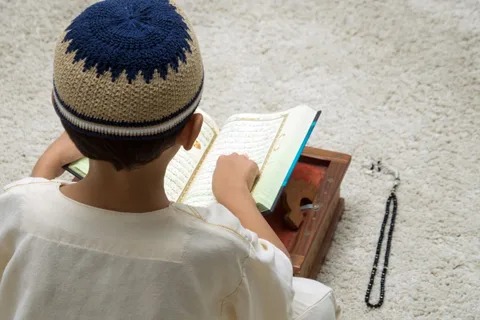In the world of Quranic recitation, two terms that often surface are “Tarteel” and “Tajweed.” These concepts hold immense significance in the practice of reading and reciting the Quran. While they may appear similar at first glance, they are distinct in their purpose and application. In this comprehensive guide on Arabian Tongue website, we will delve into the difference between Tarteel and Tajweed, shedding light on their individual roles in understanding and mastering the Quran.
Tarteel: The Melodic Recitation

Tarteel is the melodious and rhythmic recitation of the Quran. It emphasizes the clarity, beauty, and fluency of reading without rushing through the words. Tarteel involves reciting each word distinctly, allowing the listener to comprehend the message easily.
Significance of Tarteel
Tarteel holds immense significance as it ensures that the Quran is recited in a manner that conveys its message effectively. It helps in the correct understanding of the Quranic verses and their intended meanings.
Rules of Tarteel
The rules of Tarteel involve maintaining a moderate pace, perfecting pronunciation, and applying the appropriate rhythm while reciting. This helps in creating a profound impact on the listener and enhances their spiritual experience.
Tajweed: The Art of Proper Pronunciation

Tajweed refers to the set of rules and principles that govern the proper pronunciation of Quranic letters and words. It ensures that every letter is articulated correctly and with the appropriate attributes.
Significance of Tajweed
Tajweed is crucial because it preserves the purity of the Quranic text and prevents misinterpretation due to mispronunciation. It is considered an art form that adds depth and beauty to the recitation.
Rules of Tajweed
Tajweed involves mastering the correct pronunciation of Arabic letters, knowing the characteristics of each letter, and applying specific rules when reciting. This includes elongating vowels, stopping at the right places, and maintaining the proper tone.
Distinguishing Factors
While both Tarteel and Tajweed contribute to the art of Quranic recitation, they have distinct characteristics:
- Tarteel focuses on the melodic and rhythmic aspect of recitation.
- Tajweed concentrates on the accurate pronunciation and articulation of Quranic letters.
Importance of Tarteel and Tajweed in Quranic Recitation
Tarteel and Tajweed are like two pillars that support the recitation of the Quran. Together, they ensure that the message is conveyed with clarity, beauty, and authenticity.
To master Tarteel and Tajweed, individuals often seek the guidance of qualified Quranic teachers or enroll in online courses. Practice and dedication are key to achieving proficiency in both areas.
Benefits of Mastering Tarteel and Tajweed

Mastering Tarteel and Tajweed not only enhances your recitation skills but also deepens your connection with the Quran. It allows you to recite with confidence and precision, truly appreciating the beauty of the holy text.
Connecting with the Divine
Tarteel and Tajweed are not merely about reciting words; they are about establishing a profound connection with Allah. The deliberate and melodious recitation of the Quran allows believers to immerse themselves in the divine message, fostering a spiritual closeness that transcends words.
Enhancing Understanding
When we master Tajweed, we delve into the linguistic beauty and precision of the Quran. Proper pronunciation ensures that the intended meaning of each verse is preserved. This deeper understanding enriches our relationship with the Quran and facilitates a more profound comprehension of its teachings.
Inner Peace
The rhythmic recitation of Tarteel has a calming effect on the soul. It soothes anxiety and brings inner peace, allowing individuals to navigate life’s challenges with greater serenity. This tranquility stems from the profound connection with the divine that Tarteel fosters.
Recommend: Distinction Between Recitation and Tajweed.
Spiritual Growth
Tarteel and Tajweed are not static skills; they are pathways to spiritual growth. The more one delves into the intricacies of pronunciation and recitation, the more their spirituality flourishes. It’s a journey of continuous improvement that nurtures the soul.
Preserving the Quran’s Authenticity
Tajweed ensures the Quran’s authenticity remains intact. The precise pronunciation handed down through generations ensures that not a single word is altered, preserving the Quran’s purity for all time. This linguistic precision is crucial for scholars and learners alike.
Effective Teaching
Mastering Tajweed is essential for those who wish to teach the Quran. It equips educators with the tools needed to pass on the Quran’s teachings accurately. Through proper pronunciation, students receive an unadulterated learning experience.
Common Misconceptions
It’s common to confuse Tarteel and Tajweed as they both contribute to the enhancement of Quranic recitation. However, understanding their differences is essential for a comprehensive approach to Quranic learning.
Learn Now: Quran Recitation online Course For Kids.
FAQs
Is Tarteel only about the melody of recitation?
No, Tarteel encompasses more than just melody. It emphasizes clarity, fluency, and proper pacing while reciting the Quran.
Can I learn Tajweed without Tarteel, and vice versa?
While it's possible to focus on one aspect initially, it is recommended to eventually master both Tarteel and Tajweed for a holistic Quranic recitation experience.
How long does it take to master Tarteel and Tajweed?
The time required varies from individual to individual. Dedication, practice, and guidance from qualified teachers are key factors in the learning process.
Are there online courses for learning Tarteel and Tajweed?
Yes, numerous online courses and resources are available for those interested in mastering Tarteel and Tajweed.
Can children learn Tarteel and Tajweed?
Absolutely, children can start learning Tarteel and Tajweed at a young age with the right guidance and support from experienced teachers.
Conclusion
In conclusion, Tarteel and Tajweed are integral components of Quranic recitation, each with its unique role and significance. By understanding and mastering both, individuals can connect with the Quran on a profound level, reciting its verses with beauty, clarity, and authenticity.
In your journey of Quranic recitation, remember that Tarteel and Tajweed are not just skills but gateways to a deeper spiritual connection with the Quran. Mastering them will not only enhance your recitation but also enrich your understanding of this sacred text.


